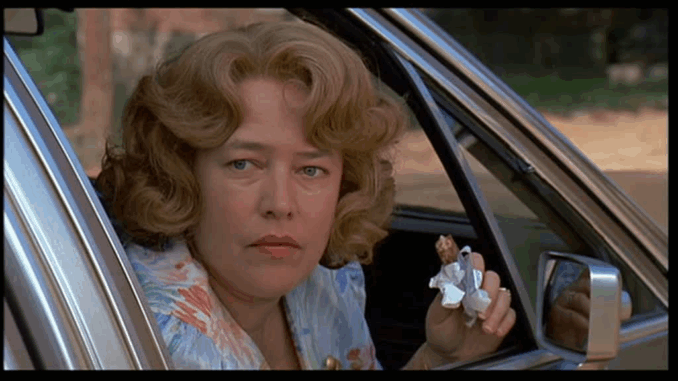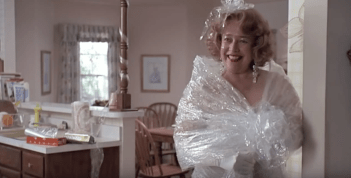
A Scene That Resonates Beyond the Screen
In a film layered with stories of resilience, transformation, and sisterhood, one moment leaps off the screen with unexpected catharsis and humor: Evelyn Couch, frustrated and exhausted by being ignored and dismissed, takes revenge with her car on two younger women who steal her parking spot. What begins as an everyday annoyance quickly morphs into a comic but deeply satisfying act of rebellion—and the birth of “Towanda.”
This moment is more than just slapstick humor or comic relief. It is a cultural rallying cry. “TOWANDA!” has since been adopted by thousands of viewers as a symbol of female empowerment, particularly among women who have felt overlooked, silenced, or underestimated.
Evelyn Couch – From Invisible to Invincible
When we first meet Evelyn (played brilliantly by Kathy Bates), she is meek, overweight, self-conscious, and constantly overlooked—by her husband, society, and even herself. Her identity has shriveled under decades of passive compliance. She tries to follow every self-help guide, every diet, every piece of advice promising to make her more palatable, more lovable.
But Evelyn’s transformation begins not with a new look or a romantic partner—it begins with a story. As she visits her husband’s aunt at a nursing home, she meets Ninny Threadgoode (Jessica Tandy), an elderly woman with a sharp tongue, a twinkle in her eye, and a vault full of stories about Whistle Stop and the legendary Idgie and Ruth.
Ninny’s storytelling awakens something in Evelyn. Through Idgie’s wildness and Ruth’s quiet strength, Evelyn starts to see what she could be. These women, who lived decades before her, somehow speak to her deepest longing: to be seen, heard, and free.
The Parking Lot Scene – An Explosion Waiting to Happen

The “Towanda” scene unfolds when Evelyn, trying to turn a new leaf, drives to the grocery store and patiently waits for a parking space. Two young, beautiful women in a red Volkswagen Beetle zip into the spot she was clearly waiting for, giggling and brushing her off with a smug, “Face it, lady, we’re younger and faster.”
The old Evelyn would have sighed, maybe muttered something under her breath, and driven away. But not today.
Instead, Evelyn calmly backs up—and then rams her car into theirs. Not once. Not twice. Six times. With each crash, she becomes more alive, more defiant. She yells, almost gleefully, “Face it, girls, I’m older and I have more insurance!” Then comes the victorious scream: “TOWANDA!!”
This primal yell is a culmination of Evelyn’s suppressed rage, sadness, and yearning. “Towanda” is the alter ego she has been cultivating in her mind—an avenging spirit, a warrior woman, a metaphor for the boldness she longs to embody.
The Role of Humor in Feminist Awakening
The genius of this scene lies in how it uses humor not to belittle Evelyn’s anger, but to validate it. It allows her to do something “bad”—deliberately crashing her car—but frames it as glorious and deserved. We laugh because it’s outrageous, yes—but also because it’s true.
Women, especially older women, are often taught to be polite, to endure disrespect, to stay small. Evelyn has done that all her life. But now, in a moment of pure emotional clarity, she seizes the steering wheel of her own destiny.
The audience laughs with Evelyn, not at her. Her act of rebellion becomes a release valve for every viewer who has ever been dismissed, interrupted, or made to feel invisible.
The Rise of “Towanda” as a Feminist Icon
Since the film’s release, “Towanda” has taken on a life of its own. The name appears on t-shirts, bumper stickers, mugs, and tattoos. Women’s groups, especially those focused on empowerment in midlife and beyond, use the name as a symbol of unapologetic self-assertion.
It’s not just about aggression—it’s about taking up space, refusing to be erased, and reclaiming identity. Towanda isn’t a real person; she’s an archetype. She’s what lies dormant in women like Evelyn—until they give themselves permission to speak out, to act, to live with full voice and presence.
In this sense, Evelyn doesn’t just “snap”—she awakens. Towanda is her birth cry into a life she never thought she could have.
Kathy Bates’ Performance and Its Impact
Kathy Bates’ portrayal of Evelyn is one of the most praised elements of Fried Green Tomatoes. She brings humor, vulnerability, and layered emotion to the role. In the “Towanda” scene, Bates manages to be both hilarious and heartbreaking. We laugh because she’s funny—but we also understand that this isn’t just about a parking spot. It’s about decades of silence and compromise erupting in one glorious moment.
Bates’ performance earned her widespread acclaim and deepened the impact of the character’s journey. Her physicality in the scene—gripping the wheel, eyes blazing, grinning with childlike joy—is unforgettable. It gives Evelyn permission not just to act, but to feel something other than shame or defeat.
Cultural Commentary – Why This Scene Still Matters
Thirty years later, the Towanda moment continues to resonate. In an era of rising conversations about female rage, ageism, and visibility, Evelyn’s story still feels urgent.
It highlights the pressures placed on women to always be “nice,” to stay agreeable, to age gracefully by fading into the background. Evelyn’s crash through that parking space—literally and figuratively—is a metaphor for refusing to disappear.
In many ways, Fried Green Tomatoes was ahead of its time. It recognized that rage, when harnessed with purpose, is not destructive—it’s revolutionary. It allows a woman to rewrite her story, as Evelyn begins to do in the scenes that follow. She takes self-defense classes. She redecorates her home. She says “no.” She says “yes.” And she does it all not for a man—but for herself.
Final Thoughts
The “Towanda” scene is more than just a cinematic highlight. It’s a battle cry for every person who has felt unheard, belittled, or left behind. It shows us that transformation is not only possible—it can be thrilling. Evelyn’s rebellion may be unconventional, but it’s not about revenge. It’s about rediscovery.
As Ninny Threadgoode says, “It’s all just a part of life, honey.” But how we live that life is what matters. And Evelyn, with Towanda at her back, decides that she’ll live it loudly, boldly, and on her own terms.
